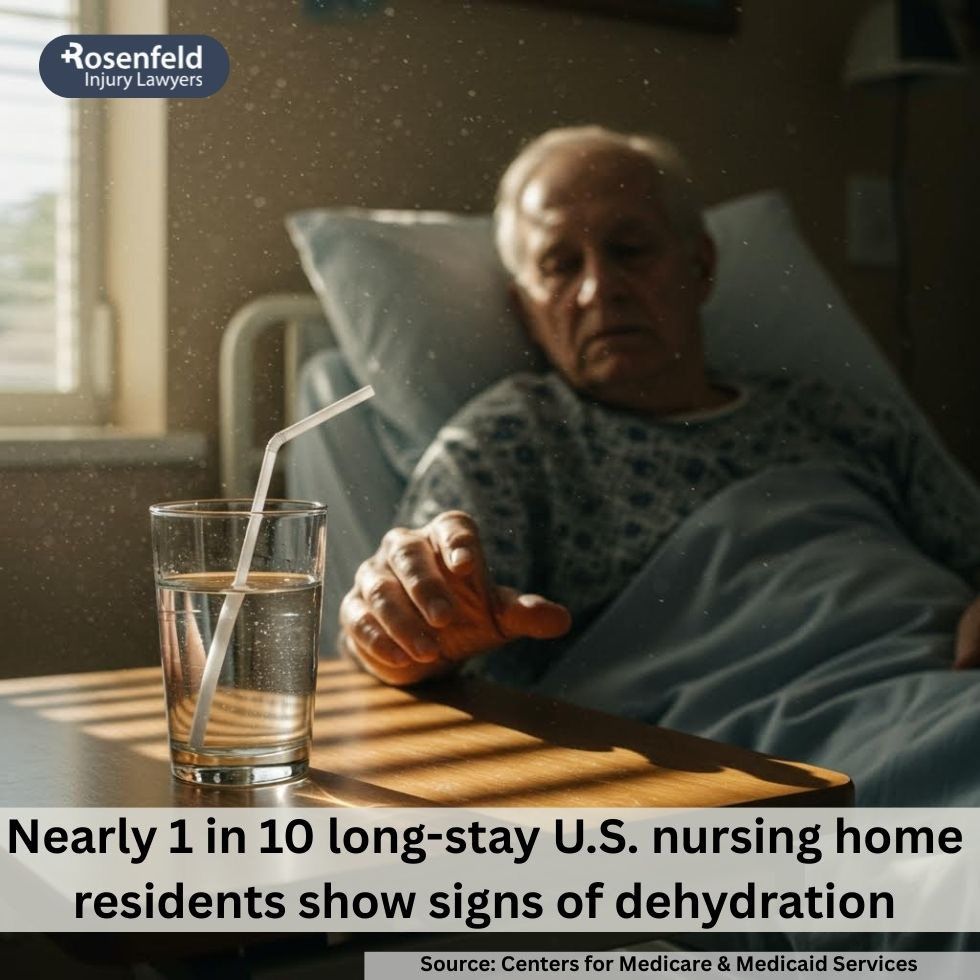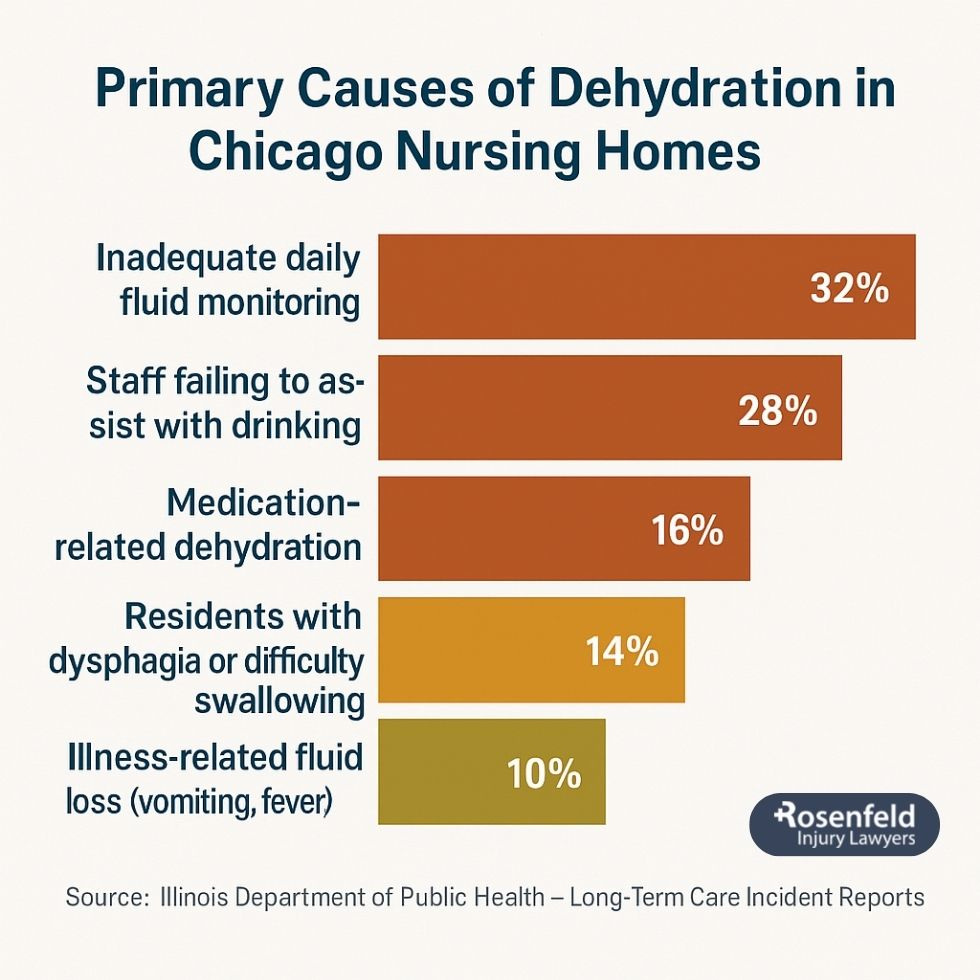Award-Winning Chicago Personal Injury Lawyer - Securing Justice
for Illinois Injury Victims - Over $450 Million Recovered

Nursing facility residents have a right to proper nutrition and adequate hydration. Sadly, assisted living facilities throughout Chicago are failing to offer these basic needs. If you or a loved one has suffered complications due to elder neglect, a Chicago nursing home dehydration lawyer from our firm can help. This type of neglect is a central focus for any experienced Chicago nursing home abuse lawyer, as lack of hydration often indicates broader systemic failures. For instance, a Chicago Nursing Home Fall Lawyer may find that a resident’s physical weakness and loss of balance were directly caused by the dizziness associated with severe fluid deprivation. Contact us today for a free consultation about your legal rights.
$3,000,000: Alan, a Bridgeport resident, was admitted to a skilled nursing facility following hip replacement surgery. Nursing home staff failed to provide adequate hydration or medical care, resulting in bed sores that led to his wrongful death.
$2,150,000: Alonzo was a nursing home patient in a Logan Square facility who died of sepsis and organ failure after staff failed to monitor fluid intake.
Dehydration is one of the most common forms of nursing home neglect. A study of eight different nursing facilities found that 68.8% of all nursing home residents had signs of dehydration.
Adequate hydration is essential to ensuring the body’s fluids remain in balance. Even moderate dehydration leads to life-threatening complications, including cognitive decline due to brain swelling, urinary tract infections, low pressure, and kidney failure from electrolyte imbalances. Chronic or severe dehydration reduces the skin’s ability to repair itself, leading to bed sores and skin infections. In these cases, a Chicago Bed Sore Lawyer is often needed to prove that the facility’s failure to provide fluids made the skin more susceptible to breakdown. Furthermore, a Chicago Nursing Home Sepsis Lawyer may be required if those preventable skin wounds or urinary infections are allowed to progress into a life-threatening systemic crisis.
With nursing home residents, dehydration can be caused by several factors. Underlying health issues, like kidney disease, muscle weakness, or difficulty swallowing, can make it hard to take in adequate water. Cognitive impairment may mean the person doesn’t feel thirsty or forgets to drink.
Care facilities are tasked with providing proper care to all residents, which includes proper hydration and adequate food. They should monitor a resident’s water intake and provide supplemental hydration if medical conditions cause the person not to drink. Ignoring signs of dehydration, such as dry mouth, weight loss, or cognitive function issues, points to nursing home negligence.
Staff members, property owners, parent companies, and administrators can all be held accountable in nursing home negligence cases involving severe dehydration or death.
The average payout for dehydration in nursing homes is $600,000. How much a victim receives for dehydration depends on factors such as medical costs, the severity of dehydration, liable parties, and available evidence.
Walter Collins, 71, was an Alzheimer’s patient at Central Nursing Home in Chicago. After his death, Collins’s estate argued that the facility provided inadequate care, including underfeeding and overmedicating him, which led to his death from sepsis.
The facility’s legal team argued that his health conditions would have resulted in death soon and that they provided proper care. Regardless, the facility settled with the family for $700,000.00.
Ethel Bolton, 84, was a patient at Glenshire Nursing & Rehabilitation Center when she was rushed to the hospital with multiple ailments, including pneumonia and skin breakdown. She passed away from skin ulcers, atrial fibrillation, and pneumonia.
Her loved ones argued that doctors failed to note warning signs, like a low albumin count, or provide adequate care. A court awarded the family $500,000.00.

Federal laws require that care homes ensure every resident has adequate and medically appropriate hydration, including supplemental hydration as needed. Fluid intake and hydration status should be closely monitored in accordance with the resident’s personal care plan (§483.25(g)).
Skin integrity is closely connected to proper hydration. Every nursing home resident should receive appropriate care to preserve skin integrity, including prompt treatment of any pressure ulcers (§483.25(a)).
The Illinois Nursing Home Care Act requires that facilities provide appropriate and sufficient nutrition and hydration in accordance with the resident’s care plan. Additionally, care homes must meet Illinois Department of Public Health standards regarding proper staffing that ensures every resident has their needs met (210 ILCS 45/3-202). These staffing standards are critical, as a Chicago Nursing Home Chemical Restraints Lawyer can explain how over-medicating residents can lead them to miss meals or fluids, while a Chicago Nursing Home Choking Lawyer ensures that those with swallowing difficulties receive the specialized assistance they need to stay hydrated safely.
In Chicago, there are enhanced penalties for offenses committed in a senior living facility, including those related to neglect or abuse (8-4-356).
Families and nursing home residents have two years to bring legal action against negligent facilities for personal injuries (735 ILCS 5/13-202) or wrongful death (740 ILCS 180/).
Dehydration can be difficult to prove, particularly if the patient has certain conditions. However, it is always the nursing home’s responsibility to protect those under its care. Follow these steps to begin the process toward justice.
Seek Medical Treatment: Dehydration can be extremely dangerous. Get your loved one to a hospital where they can receive appropriate hydration treatment. You may also wish to have the patient transferred to a different facility at this time.
Secure Medical Records: Request records from the nursing home and any medical facilities where your loved one has been seen, both before and after the dehydration was discovered. Document all medical expenses related to the case. Gather a full list of any medications and diagnoses your loved one may have, as well as any doctor’s orders regarding special dietary needs.
Interview Witnesses: Talk to other nursing home residents and staff members to see if they noted any signs of dehydration or observed the resident being denied water. Note down dates, times, and locations, such as whether the patient refused meals or complained of headaches.
Report the Nursing Home to the Department of Public Health: Call the Nursing Home Hotline (800-252-4343) or submit a complaint online to document the abuse.
Do Not Speak to Insurance: The nursing home’s insurance company or administrators may push to settle for less than your family deserves. Do not sign anything or speak to them without an attorney present.
Contact a Nursing Home Abuse Attorney: Schedule a free case review with our compassionate attorneys. Our team will review your complaint, discuss your legal options, and explain the next steps toward justice.
Our Chicago personal injury lawyers are passionate about holding negligent facilities accountable for dangerous dehydration. We have secured over $450 million in positive verdicts and settlements over the past 25 years, earning us a place in the Million Dollar Advocates Forum and the prestigious Super Lawyers® designation.
After your consultation, we will thoroughly investigate the case, interviewing witnesses and reviewing records to understand how the dehydration happened. Our legal reach extends to all forms of resident harm; we act as a Chicago Nursing Home Broken Bone Lawyer when neglect leads to fractures and a Chicago Nursing Home Infections Lawyer when poor hygiene causes illness. Additionally, our firm provides a Chicago CILA Abuse Lawyer for those in community-integrated settings and a Chicago Nursing Home Sexual Abuse Lawyer to protect the most vulnerable from intentional harm. We’ll also consult with medical professionals who can attest to how long the nursing home patient was dehydrated and what long-term effects this may cause.
Once we have gathered evidence, our team will negotiate with the facility on your behalf, allowing you to focus on caring for your loved one and moving forward with your healing process.
Many cases are settled out of court, enabling families to prioritize recovery. However, some nursing homes will refuse to cooperate. In this case, we will file a lawsuit and guide you through the court system, keeping you updated every step of the way. Our priority is to respect your family’s dignity and privacy while giving you the best chance of compensation.
Our team works on a contingency fee basis: no fees unless we win. Schedule a free consultation today by contacting us online or calling (888) 424-5757.
Sources: Law.com